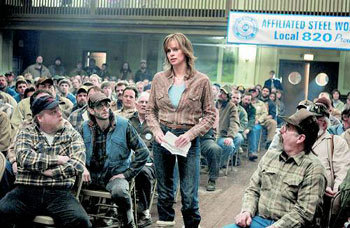North Country

Most actresses experience a satisfaction akin to pride when they see their faces light up on the big screen. However, some actresses feel a strange sense of accomplishment when they see their lovely images ruthlessly mangled onscreen. They become addicted. North Country, which comes out on April 27, stars Hollywood star Charlize Theron (31). She is the type of actress in the latter group.
This breathtakingly beautiful actress has made five movies since winning the Academy Award for actress in a leading role in 2004 for the movie Monster. Among these, it is no coincidence that North Country has been tagged within Korea as a follow-up of Monster. In Monster, after being sexually abused by a group of men, Theron realistically portrays an unfortunate prostitute who becomes a serial killer, and in North Country also, after suffering sexual harassment from male miners, she plays a female miner who files a lone lawsuit against the coal company.
For Monster, Theron gained 13kg and was transformed into an ugly woman, giving a visual shock to those who remembered her beautiful face. In North Country she is covered in black coal dust and shouts for womens rights. Theron actually pushes her eye-catching looks to the side, trying to make the jump away from them.
.
Divorced after enduring her husbands abuse, Josey returns to her native northern Minnesota. In order to support her children, Josey decides to work in the high-paying coalmines. However, this conservative coal-mining village only considers men as workers. Despite hearing criticism including, Shes taking the mens work, Josey continues working, suffering from the male miners skillful discrimination and cruel sexual abuse. Josey tries to sue the company for sexual harassment, but the other women workers who want a quiet life abandon her.
The subject of this movie is based on the first work-related sexual harassment case in the United States in 1984, but the account is fictionalized. To put it plainly, anyone can see that despite being politically correct, most of the setting and conversation is trite and predictable. Since Adam and Eve, men have been hitting on women, say the men who take the sexual harassment for granted, and even Josey who declares, Now Im going to live by my own strength. This is our business, and it is a problem for all women, never departs from using banalities. The classification of good and evil is simplified, and the court reversal in the final scene which resolves the conflict in the movie in one fell swoop is so Hollywood that it makes you doubt its a true story.
However, this indicative mood is perhaps the best way to effectively portray the despair and urgency Josey experiences. The film doesnt beat around the bush concerning the message it would like to communicate, and it follows one course without stopping in a powerful and concentrated manner. The movie does not cause the viewer to experience Joseys pain. Rather, it throws the viewer into a situation to feel it clearly. The movie is a bit dull but simple, and repetitive but cruel.
Because the message is so direct, it is important who you go with to see the movie. It is recommended for women who have received stress from macho superiors in the office, who will be angered and thrilled by the movie. However, it is not recommended for viewing with a boyfriend youve only dated for a short time. You might lose all interest in the animal known as man after watching the movie. Men, shame on you.
Directed by Niki Caro, the New Zealand director of Whale Rider. Rated for ages 15 and up.
Seung-Jae Lee sjda@donga.com







